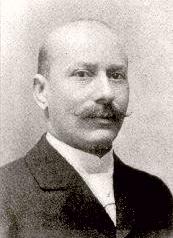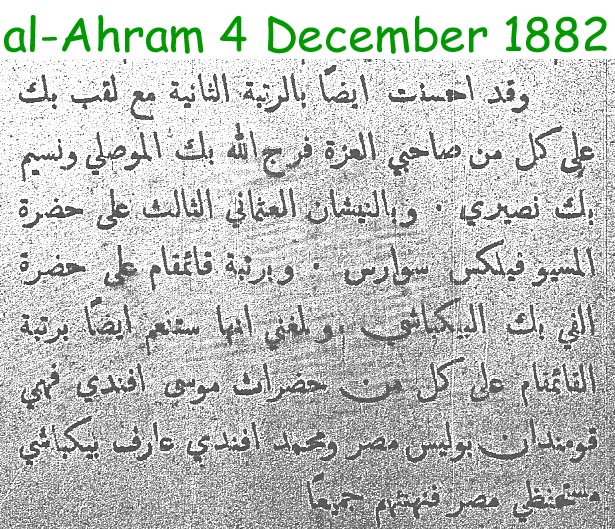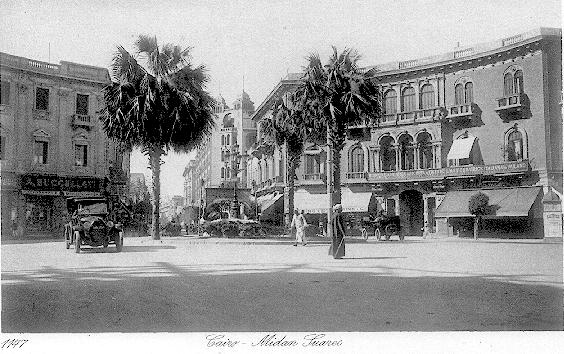A hundred years ago the Suares trio did for the Egyptian economy what the Sawiris brothers aim to do today
by Samir Raafat
Cairo Times, December 24, 1998


Raphael Suares, Samih Sawiris
|
|
|
|
|
|
EGY.COM - PERSONALITIES
|
|
by Samir Raafat
Cairo Times, December 24, 1998


Raphael Suares, Samih Sawiris
Egypt 1898. The days of receivership brought on by Khedive's Ismail's debts are finally over. While the Khedive may have lost his realm back in 1879, his principal local bankers, Delors & Suares have since grown into one of Egypt's biggest private banking houses spawning many industrial, real estate and financial concerns.
The culmination of Egypt's privatization and economic revival occurred in June 1898 with the launching of the National Bank of Egypt, the country's first regulatory and issue bank. The associated sell-off of Daira Sanieh, the then-largest state-run company, not only transferred 100 percent of the agricultural conglomerate to the private sector, but also involved the founding of a new landed gentry sparking an unprecedented era of economic well-being.
No doubt the newly privatized Daira was the primary engine for Egypt's rejuvenated economy. Responsible for this single most important anchor-investor deal in Egypt's modern history were the Suares brothers, Felix, Joseph and Raphael. Their mercantile father, Isaac, spared nothing towards his sons' education. The financial payoff was astounding for both the Suares dynasty and for their country of adoption.

Eighteen years earlier the Suares name had already made headlines when, with French partners, the Suares family helped create the Credit Foncier Egyptien. Despite a bumpy start, this monumental commercial undertaking ultimately did away with money grabbing usurers while laying the seeds for agricultural reforms.
The Suares name was equally celebrated in the field of transport when Isaac launched Cairo's first modern public transport service dubbed "arabiyaat Sawarez," where horse-drawn carriages plied defined urban routes, one of them going as far as Bassatine east of Cairo.
Another transport milestone occurred in 1889 when Isaac's sons launched Egypt's first suburban railway (forefather of Egypt's first underground metro) running from Bab al-Louk to Helwan. Other important Suares-controlled railways included the Egyptian Delta Light Railway Lower Egypt and the Qena to Aswan Railway in the South.
Raising the required capital for land purchases, rolling stock and chain gangs, was no problem. The Suareses either owned or were connected with Egypt's principal investment houses earning them the sobriquet of Egypts's Rothschilds. And like the original Rothschilds they too had become lenders to the khedive which in those days meant the State.
When it came to real estate development, the Suares brothers were responsible for much of Helwan's modern utilities and pleasure institutions. Not only did they control the spa's thermal baths, hotels and casinos, but it was Felix Suares who turned on the town's first electric street lamps in a much publicized event in 1899.
Continuing to capitalize on the economic boom brought on by privatization, Felix and his relations concluded in 1904 a deal calling for the creation of a well conceived garden suburb midway along their suburban railway line. They would call their new development Maadi.
Recognition by the State and its rulers--British and Egyptian alike-- was never far behind. Summarizing it best are the words bestowed by Khedive Abbas Hilmi II on his financial advisor Raphael Suares on the occasion of the February 1909 re-launch of the Naga Hamadi sugar refinery.
In the presence of his royal guest and the other members of the sugar company's board, Suares, in his capacity of principal shareholder of the Societe General des Sucreries et de la Rafinnerie, gave the welcome speech.
Impressed with what he saw the Khedive responded by reading out an imperial firman conferring on Suares the Ottoman Grand Order of the Medjidieh First Class.
"Votre nom, Monsieur Suares, est étroitement uni a toutes les entreprises utiles du pays. Je suis heureux de vous éxprimer publiquement ma gratitude en vous confèrant la premiere classe de la Médjidieh".
By this deed the khedive acclaimed more than just the rejuvenation of Egypt's sugar industry--the country's second largest single employer after cotton. Abbas Hilmi II knew only too well how the Suareses had been to some extent responsible for other major agro-industrial concerns across Egypt, which followed the creation of the Aswan and Qena reservoirs. Not only had these enterprises created massive numbers of jobs and lucrative export markets, but equally important, the new dams (barrages) provided cheap electricity and introduced Egypt's first system of perennial irrigation. The result was a sharp rise of agricultural land value which set off a secondary wave of new-rich.
Acknowledged as Egypt's leading real-estate barons, the Suares brothers owned large chunks of land in what was originally called Ismailia, a district of Cairo stretching from Midan al-Opera to Midan Ismail (today, Midan al-Tahrir). The Suares bank itself was located behind the Credit Foncier Bank, in a wing of the Suares Building that faced one of the city's principal squares. It therefore came as no surprise when the square was named 'Rondpoint Suares' a name which remained in use even after it was re-christened Midan Moustafa Kamel in honor of Egypt's first nationalist whose statue graces the square to this day.
This new moneyed class was not the unique result of Egypt's 'first' privatization efforts. Whole new cadres of white-collar workers and executives also came on stream thanks to a now affordable western education.
Come to replace the liberal economic period was a national bourgeoisie from among the ranks of the 1919 Revolution "Young Egyptians" many of whom owed their well-being to the Daira Sanieh privatization. One of them, Talaat Harb Pasha, who had openly aligned himself with many of the "foreigners," belonged to that emerging class of Egyptian taipans. It was primarily because of his earlier association with the Suareses, and by fronting for the likes of former Finance Minister Youssef Cattaui Pasha, himself a Suares son-in-law, that Harb ultimately co-launched Banque Misr and its associated group of companies earning himself the sobriquet of 'father of Egyptian commercial enterprise'.
Nationalist capitalism also produced the likes of Farghali and Aboud Pashas, cotton and sugar kings respectively. Together these new boardroom entrepreneurs formed the legacy of the Suares family.
Of the original Suareses none remain today. In fact, hardly anyone remembers them. Their descendants left Egypt a long time ago and were since replaced by new power elites. The only landmark that survived bearing their name is a square in the township of Maadi. And even that has faded from memory since the name was unintentionally corrupted to "Sawiris."
But is the public mistaken in applying the misnomer? Not entirely!

Suares roundabout later renamed Midan Moustafa Kamel in 1940 at the uncovering of the latter's statue sculpted in France in 1912 by Leopold Sevine building to right of roundabout designed by architect Antonio Lasciac for account of Suares later known as Club Risotto for hosting an Italian social club on its first floor
Egypt 1998. The prevailing imperatives of globalization greatly diminished the role of national and state-run economies. Today's economic liberalization, if not identical to that which succeeded Daira Sanieh's privatization in June 1898, has an uncanny similarity to it.
Perhaps it's not too much of a stretch to even assert the Suareses have returned, albeit in a homegrown version under the name of Sawiris.
If last century one read about feats by Joseph, Felix or Raphael Suares, today we read about the achievements of Naguib, Samih or Nassif Sawiris. Their father, Onsi Sawiris, having seen his contracting company taken away in the Socialist onslaught of 1961 went to Libya to rebuild his fortune. With Sadat's Infitah (open door policy) of the late 1970s, the patriarch returned to Egypt in time to see his sons participate in the building of a new corporate empire.
Remarkably neither the Suares or the Sawirises belonged to the mainstream clannish majority. If the Suareses in 1898 helped create Egypt's first bank of issue, a century later the Sawiris Group are National Bank of Egypt's largest private borrowers. The Maadi and Helwan of a century ago are being replicated along the Red Sea coast as Gouna and Taba Heights.
Similarly the fine Sawiris hotel properties located around Egypt and the first class eateries in and around Cairo's chic quarters are not unlike those fin de siècle Helwan casinos.


And if we are raving about the arrival of IT (information technology) in the form of MobiNil cellulars and Orascom-imported computers, this is reminiscent of Suareses transport-communication revolution of the 19th century. In fact, the concept of bringing the town to the railway line in 1904 could be matched by attempts at bringing the railway to El Gouna.
Just as the Suareses were partly responsible for dams across the Nile, today the Sawiris are to some extent responsible for its new bridges.
Even when it comes to philanthropy and community work, the Suareses may have found their match in their latter day near-namesake. Hopefully, one can expect that from among the ranks of the many eager young men and women who work for one of the Sawiris-owned companies, a new Talaat Harb will emerge.
And while a member of the Sawiris family sits in parliament today and another is a member of a policy-making panel, a son in law of Joseph Suares was a founding senator of Egypt's first constitutional parliament of 1924, and another Suares (Madame Cattaui Pasha) was first lady-in-waiting to the Queen. It is no coincidence either that with time and because of their increasing wealth, both families, with almost a century separating them, solicited and received special "consideration" from the powers that be.
Whether or not the Suareses and their counterparts greatly benefited from concessions and tax privileges under the Capitulations laws favoring foreigners, today's venture capitalists undoubtedly profit from special tax breaks, free-zone benefits and customs exemptions under a complicated regime of laws tailored to boost investment. In either case, the outcome is the same. The men with vision are back, unafraid to take risks with their venture capital. Which is why today, just as 100 years ago they are duly recognized by Egypt's government and head of state.
Can we therefore blame those suburbanites who mistakenly call Midan Suares "Midan Sawiris"?
Needless to say, Sawiris is not Suares and neither is Egypt of the 1990s Egypt of the 1950s. The Middle East has changed drastically in half a century. Still, history holds lessons that could be worthwhile to emerging dynasties. The question therefore remains, will the Coptic Sawiris family one day fade into the unknown horizon as did the Jewish Suareses before them? As we all know, nothing lasts forever.…
|
|
|
Subject: Sawiris - swimming with every current Date: Thu, 26 Jan 2012 09:01 From: M. Lewa The Jewish Suares family operated in a laissez faire environment benefiting from protection offered by a regime of capitulations favoring foreigners in Egypt. the Coptic Sawiris family on the other hand simultaneously took advantage from democracy in the west while reveling in the benefits of dictatorship in our country. Their capacity to shift camps was evident when they applauded Mubarak even as Egypt was ridding itself from his 30-year dictatorship, and then suddenly jumped ship claiming to have been with the Tahrir revolutionaries all along! Political chameleons or downright opportunists... Subject: Your Article on Suares Date: Thu, 6 Jan 2000 17:01:30 -0800 From: Alfred Dayan It happens that I am a direct descendant of Suares. My Grandmother Victorine Suares (Victorine, my grandmother, was a daughter to Isaac Suares) married Alfred Dayan my grandfather. Unfortunately they both died young, and my father, Leon Dayan also died young, in 1935; so I do not know which brother was her father. I was born in Heliopolis and left Egypt in 1948, at the age of 15. So I have very clear memories of Midan Suares and the Maadi-Helouan railway. Some sketchy information on my Suares ancestors. It seems that Period. Did I say sketchy? rudimentary! Subject: Fortunes Date: Wed, 06 Oct 1999 11:03:51 -0700 From: Joseph Nawar Of great interest was your article about the Suares/Sawiris. Your article left me with the sense that the Sawiris are prospering (no question that they have great business smarts) partially because of intricate government laws favoring foreign investments and influential people. Doesn't such preferential treatment or inequality brings about discontent from the less fortunate (or less ambitious). There is no question that through the ages money and wealth have brought nations up and down. Though it is sad to see it happen so many times as if no lesson was learned from past mistakes. Recently, I visited Egypt after a long absence. And looked at my father (who had decided to stay in Egypt). I looked at what he had built, his dreams, ambition, belief in his country, loss of everything, his imprisonment, his courage to re-build again, betrayal, never ending frustration at the endless contradictions and on and on. Egyptians in general are life-loving people and hopefully that will continue to keep them focused on the right path and avoid making the same mistakes again. |
|
|
|
|